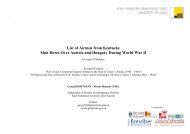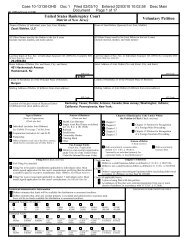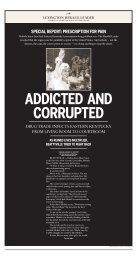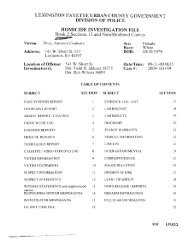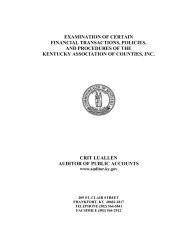Response to motion for summary judgment - Kentucky.com
Response to motion for summary judgment - Kentucky.com
Response to motion for summary judgment - Kentucky.com
You also want an ePaper? Increase the reach of your titles
YUMPU automatically turns print PDFs into web optimized ePapers that Google loves.
There is sufficient evidence <strong>for</strong> a jury <strong>to</strong> determine that Clarence McCoy and/or Maria Jones<br />
used excessive <strong>for</strong>ce on Gerald Cornett on the night in question. The Plaintiff is not asking the jury<br />
<strong>to</strong> speculate but <strong>to</strong> infer that this incurred from circumstantial evidence and expert testimony. In this<br />
particular case especially, where several of the eyewitness Defendants have been indicted <strong>for</strong><br />
falsifying reports, “‘[c]ircumstantial evidence is not only sufficient, but may also be more certain,<br />
satisfying and persuasive than direct evidence.’” Desert Palace, Inc. v. Costa, 539 U.S. 90, 100<br />
(2003).<br />
A. Summary Judgment Standard<br />
Under Rule 56(c) of the Federal Rules of Civil Procedure, <strong>summary</strong> <strong>judgment</strong> is only proper<br />
"if the pleadings, depositions, answers <strong>to</strong> interroga<strong>to</strong>ries, and admissions on file, <strong>to</strong>gether with the<br />
affidavits, if any, show that there is no genuine issue as <strong>to</strong> any material fact and that the moving party<br />
is entitled <strong>to</strong> a <strong>judgment</strong> as a matter of law." See, e.g. Celotex Corp. v. Catrett, 477 U.S. 317, 322,<br />
106 S.Ct. 2548, 91 L.Ed.2d 265 (1986). In reviewing a <strong>motion</strong> <strong>for</strong> <strong>summary</strong> <strong>judgment</strong>, "this Court<br />
must determine whether 'the evidence presents a sufficient disagreement <strong>to</strong> require submission <strong>to</strong><br />
a jury or whether it is so one-sided that one party must prevail as a matter of law.' " Pat<strong>to</strong>n v.<br />
Bearden, 8 F.3d 343, 346 (6th Cir.1993) (quoting Anderson v. Liberty Lobby, Inc., 477 U.S. 242,<br />
251-52, 106 S.Ct. 2505, 91 L.Ed.2d 202 (1986)). The evidence, all facts, and any inferences that may<br />
permissibly be drawn from the facts must be viewed in the light most favorable <strong>to</strong> the nonmoving<br />
party, here, the Plaintiff. Matsushita Elec. Indus. Co., Ltd. v. Zenith Radio Corp., 475 U.S. 574, 587,<br />
106 S.Ct. 1348, 89 L.Ed.2d 538 (1986).<br />
B. Anthony Estep, Kenneth Isaacs, Ronald Gaunce, and Robert Williams are entitled <strong>to</strong><br />
<strong>summary</strong> <strong>judgment</strong> on Plaintiff’s excessive <strong>for</strong>ce claims, and ruling should be reserved<br />
as <strong>to</strong> LaFoe.<br />
32



